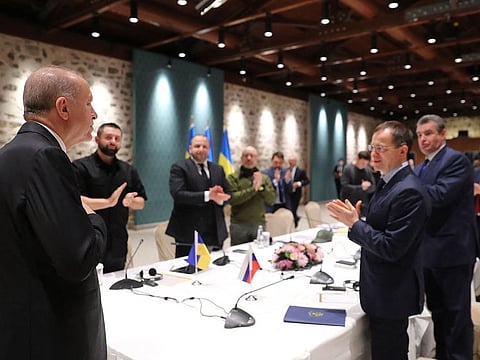West needs to support Russia-Ukraine talks
Moscow and Kyiv must continue the talks to reach a peaceful settlement to the conflict

After five weeks of intense fighting, a glimmer of hope emerged on Tuesday as officials from Russia and Ukraine began peace talks in Turkey for what Moscow described as “an important” round of talks on ways to end the war.
During the first face to face talks between the two sides in three weeks, Russia promised to scale down its military operations around the Ukrainian capital Kyiv and the northern city of Chernihiv, a significant gesture by Moscow that will likely limit the scope of the conflict and mitigate the risk of widening it beyond Ukraine’s border. Meanwhile, Ukrainian negotiators proposed neutral status with international guarantees to protect it from future attacks.
The talks were agreed following a telephone call between Russian President Vladimir Putin and his Turkish counterpart Recep Tayyip Erdogan on Sunday. The world hopes the talks will lead to an immediate ceasefire, the Turkish leader told the delegations in Istanbul before the start of the talks.
On 24 February, Russia sent tens of thousands of troops into Ukraine in what it said a special operation to ‘deter the threat’ emanating from the Western-led militarisation of its smaller neighbour and root out what the Kremlin described as ‘anti-Russia Nazi’ factions.
Neutral status
So far, nearly 4 million Ukrainians have fled their country to neighbouring safe havens and much of the country’s larger cities have been destroyed by the war. Unprecedented sanctions have been imposed by most of the West on Russia. Previous talks, hosted by Belarus, failed to make any progress as Kyiv refused a key Russian demand that Ukraine becomes “a neutral” country.
However, on Sunday, Ukrainian President Volodymyr Zelenksy said the Russian demand was being “closely looked at” by his negotiators in Turkey, thereby allowing the talks to go ahead. Russia says Ukraine’s neutrality is key to the security guarantees it has demanded from Nato, which has expanded in Eastern Europe since 1999 despite Moscow’s objections. “We will not host foreign military bases on our territory, as well as deploy military contingents on our territory, and we will not enter into military-political alliances,” Ukrainian negotiator Oleksander Chaly.
Meanwhile, in a reciprocal move that will certainly reinforce world hopes of ceasefire, Russian Deputy Defence Minister Alexander Fomin said his country had decided to scale down fighting near Kyiv and Chernihiv to help boost the talks’ chances of success and “create the conditions for dialogue”.
These encouraging signs need serious support from key Western powers. United States may have to tone down its hawkish remarks, particularly those by President Joe Biden in recent days.
US allies in Europe have distanced themselves from Biden’s regime change remarks. Now they need to encourage both Moscow and Kyiv to continue the talks to reach a peaceful settlement to the conflict that has fundamentally shaken the world order.



